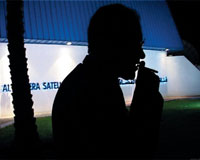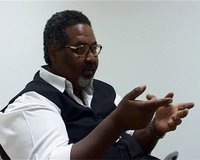 Unofficial MovieNite (Stuart sick)
Unofficial MovieNite (Stuart sick)Incredibly late pizza, Ice Cream
Columbia Journalism Review: Samir Khader, a senior producer for the controversial Arab network, is an equally complex figure, motivated by an apparent mix of cynicism and idealism. “You can’t wage a war without news, without media, without propaganda,” he declares. Khader presses for war coverage that emphasizes its human toll, including casualties inflicted on Iraqi women and children. Nevertheless, the Iraqi-born journalist later confesses that he dreams of moving to America. “Between us,” he says, “if I am offered a job with Fox, I will take it.”These vignettes lend Control Room an endearing quirkiness that has no doubt contributed to its popularity on the film-festival circuit. But they also underline director Jehane Noujaim’s humanistic message — about the elusiveness of objectivity, the validity of clashing points of view, and the urgent need for the Arab world and the United States to find common ground. A film essay by a journalistic outsider, Control Room focuses on both control of the news and, ironically, lack of control — most evident in the tragic bombing death of an Al Jazeera Baghdad correspondent who may or may not have been targeted by U.S. forces.
Noujaim, a young Egyptian-American filmmaker best known for co-directing Startup.com, majored in both visual arts and philosophy at Harvard, and Control Room is at least partly an epistemological meditation. At its heart is the Qatar-based and financed network that, in its eight brief years of existence, has managed to enrage both Arab dictators (who have frequently censored and suppressed it) and top U.S. officials. In Control Room, Secretary of Defense Donald Rumsfeld is a recurrent hectoring presence, scoring Al Jazeera for “playing propaganda” and neglecting the truth about U.S. involvement in Iraq.
Al Jazeera’s version of the truth has unquestionably won it a big following — 35 million or more viewers — on the so-called Arab street, symbolized in the film by the coffee houses of Doha, Qatar. Launched by former BBC employees, the network, as seen through Noujaim’s lens, defies easy categorization. It features decidedly untraditional female anchors and producers in Western dress, simultaneously translated interviews with non-Arab sources, and a panoply of grisly and unsettling images generally eschewed by the U.S. media: of injured Iraqis, dead U.S. soldiers, and dazed U.S. POWs. Noujaim offers no narration, but her view seems clear enough: If Al Jazeera is biased, its biases are certainly no worse, and no less understandable, than the nationalistic biases of Fox News and other U.S. outlets.
Interview with Jehane Noujaim: "Rail: I imagine reporters at Al Jazeera would definitely be motivated to think about it. But how was Al Jazeera going to help you figure it all out? They were declared enemy propagandists by the U.S., and lots of Arab leaders banned it.
Noujaim: Yeah, but if they’re hated by everybody, there has to be something interesting going on there. The people who go to Qatar, leaving state-run journalism in countries like Jordan and Sudan, to live in a desert in the middle of nowhere… you have to think that these people will be like revolutionaries. I was inspired by these people who are trying to create an understanding on both sides. I’ve spent my whole life trying to bring the two worlds together. Living back and forth between Egypt and the U.S., I was always looking at what one side thinks and then what the other side thinks. There were very different stories being told about the same subject. We forget how perspective means everything. Where you stand, I mean literally stand, means everything. I wanted to make a film about this issue of perspective.Rail: Interestingly enough, you didn’t end up taking sides with Al Jazeera. You show Lt. Josh Rushing, who is the U.S. military’s press officer also based in Qatar, as a complex character. He speaks about being disgusted when he saw Al Jazeera’s controversial first broadcast of U.S. POWs, until he remembered that he had seen similarly graphic images of Iraqi soldiers killed the night before and hadn’t felt disgusted.
Noujaim: When I was introduced to Lt. Rushing, he basically blasted every stereotype I had about the military. I thought that they wouldn’t be able to talk about how they felt about what was going on. I was very intrigued by him. I knew he would be challenged constantly because his job was to explain the U.S. presence in Iraq to people that were very hostile to it.He said to me, 'I wouldn’t be able to do this job if I didn’t really truly believe in what I was doing.' And I believed him when he said that. I came to respect him for engaging the other side. He didn’t give flat answers. He talked to Al Jazeera journalists for hours. He didn’t have to do that—he could have given them the military line that he had for that day.








No comments:
Post a Comment